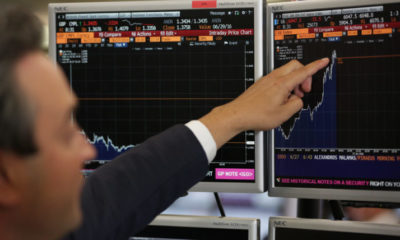The euro experienced a significant decline in early trading on Monday following initial projections indicating a left-wing coalition was poised to win the French legislative elections.
The currency fell as much as 0.4% amid growing concerns about France’s financial future under a government led by the New Popular Front (NPF).
In a surprising turn of events, the NPF emerged as the likely front-runner, contrary to earlier expectations that Marine Le Pen’s far-right National Rally would secure the most seats.
Instead, the National Rally is now projected to come in third, following President Emmanuel Macron’s centrist alliance.
French government bond futures also underperformed compared to their German counterparts, reflecting market anxiety over the potential shift in France’s economic policy.
One of the NPF bloc’s leaders, Jean-Luc Mélenchon, has vowed not to negotiate with other parties to form a government and to stand firm on the coalition’s agenda, which includes substantial increases in public spending. Such measures are expected to create friction with the European Union.
Krishna Guha, a strategist at Evercore ISI, noted the market’s mixed reaction in a client note.
“The show of support for the left/far-left and calls by far-left leader Mélenchon to enact the full hard-left NPF agenda will unsettle some investors,” he wrote.
“But we view the outcome as broadly market-friendly, with National Rally-related risks disappearing for now and the left/far-left NPF set to fall far short of a majority with essentially no prospect of being able to enact its agreed alliance agenda.”
Asian markets reacted to the news with a downturn. Shares in the region retreated, and South Korea’s three-year bond futures reached their highest levels in nearly two years.
In addition, Samsung Electronics Co. workers are expected to initiate a major labor action, the most significant in the company’s history.
Meanwhile, the People’s Bank of China announced it would conduct temporary bond repurchase operations as necessary to maintain adequate liquidity in the banking system. This move is intended to ensure stability amid the broader economic uncertainty.
Traders are also keeping a close eye on upcoming events in the United States. Federal Reserve Chair Jerome Powell’s congressional testimony and new inflation data later this week are anticipated to influence market sentiment further.
Following a soft jobs report, there is increasing speculation that the Federal Reserve might ease policy as early as September.
The recent nonfarm payrolls data indicated a slowdown in US hiring and wage growth, coupled with a rise in the unemployment rate to its highest since late 2021.
This has bolstered expectations of a potential rate cut by the Federal Reserve, adding another layer of complexity to the global economic outlook.
Back in the US, President Joe Biden is facing renewed challenges within his own party as he gears up for a reelection campaign. Despite achieving his best showing in recent polls, Biden continues to navigate a turbulent political landscape.
As the week progresses, market participants will be closely monitoring rate decisions from central banks in New Zealand and South Korea, as well as earnings reports from major US banks, including JPMorgan Chase & Co.
These developments, coupled with Powell’s testimony and subsequent remarks from Fed officials, are expected to provide critical insights into the future direction of economic policy.
In the commodities market, oil prices ticked up ahead of reports from the Organization of Petroleum Exporting Countries and the International Energy Agency, which are expected to shed light on global crude balances.
Also, traders are tracking the path of Tropical Storm Beryl as it approaches Texas, which could impact oil supply and prices.
Gold, on the other hand, eased off the six-week high it reached last week, reflecting the fluctuating market dynamics.
As the political landscape in France and economic indicators globally continue to evolve, investors remain vigilant, adjusting their strategies to navigate the uncertainties ahead.


 Naira4 weeks ago
Naira4 weeks ago
 News3 weeks ago
News3 weeks ago
 Education4 weeks ago
Education4 weeks ago
 Social Media4 weeks ago
Social Media4 weeks ago
 Technology4 weeks ago
Technology4 weeks ago
 Investment4 weeks ago
Investment4 weeks ago
 Dividends4 weeks ago
Dividends4 weeks ago
 Economy4 weeks ago
Economy4 weeks ago


























